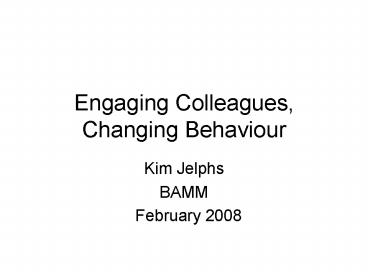Engaging Colleagues, Changing Behaviour - PowerPoint PPT Presentation
1 / 31
Title:
Engaging Colleagues, Changing Behaviour
Description:
When Giants Learn To Dance, Rosabeth Moss Kanter. So what is influencing? A ... Next steps. Towards effective negotiations. Focus on interests not positions ... – PowerPoint PPT presentation
Number of Views:62
Avg rating:3.0/5.0
Title: Engaging Colleagues, Changing Behaviour
1
Engaging Colleagues, Changing Behaviour
- Kim Jelphs
- BAMM
- February 2008
2
(No Transcript)
3
Health Care Team Innovation
Innovation in quality of care
Professional diversity
4
Know yourself
- Emotional Intelligence
- Self Awareness
- Self Regulation
- Motivation
- Empathy
- Social Skill
- (Daniel Goleman)
- Value and recognise difference
5
In groups the root causes
- What gets in the way of engagement ?
- Why do people behave in challenging ways ?
6
Handling Conflict
7
Transition and Change
- Change is not the same as transition. Change is
situational the new site, the new structure, the
new team, the new role, the new procedure.
Transition is the psychological process people go
through to come to terms with the new situation.
Remember that change is external and transition
is internal - William Bridges
8
Help people understand why change is happening
People responsible for planning and implementing
change often forget that while the first task of
change management is to understand the
destination and begin work on how to get there.
The first task of transition management is to
convince people to leave home. Youll save
yourself a lot of grief if you remember
that William Bridges (2003)
9
(No Transcript)
10
Anticipating potential responses
- If the people issues are not identified and
managed effectively, the following problems may
arise - strong emotions, such as fear, anger,
hopelessness and frustration - people become defensive
- constant complaining, questioning and scepticism
- increase in absenteeism, sickness and people
leaving the organisation - fall in morale and job satisfaction
- people dont match words with deeds
- conflict can become more difficult to resolve
11
Dimensions of responses to change
Lower capacity for personal change
SUBVERT
EXALT
More in favour of organisational change
Less in favour of organisational change
AGAINST CHALLENGING
FOR CHALLENGING
Higher capacity for personal change
12
Scheins model of transformative change
- 3 stages
- Unfreezing Creating the motivation to change
- Learning new concepts and meanings from old
concepts - Refreezing Internalizing new concepts and meaning
13
Exercise
- Q Think of a recent skill that you had to learn
in order to keep up with external changes. - What were your survival anxieties?
- What were your learning anxieties?
- What helped you to change?
- (Cameron and Green 2005 Making sense of change
management )
14
Do not label people
Innovators
Late Majority
Early Majority
Early Adopters
Laggards
Rogers E, (1985), Diffusion of Innovations, The
Free Press, New York
15
Being a laggard !
- Concerns often reflect an inability to
- do the new job
- understand / accept the reason for the change
- learn new skills, techniques or knowledge
- fit in with new people
- cope with new boss
- manage the changes within preferred lifestyle
16
Commitment , Enrolment . Compliance (Senge Fifth
Discipline )
- Commitment
- Enrolment
- Genuine Compliance
- Formal Compliance
- Grudging Compliance
- Non Compliance
- Apathy
17
Engaging Clinicians
- Has to make sense (IHM saving 100, 00 lives )
- Memories and history
- Convergence Leicester Royal Infirmary (BPR)
- Involvement
- Adaption not adoption
18
Challenges for Clinical Directors
- Communication
- Wicked problems
- Working with difficult people
- Personal fears
- Time management
- Riley, J (1997) Helping Doctors who manage
learning from experience. Kings Fund
19
Lewins force field analysis
20
THE LEVERS OF CHANGE (Leavitt)
PEOPLE
STRUCTURES
- SYSTEMS
TASK
21
Influencing
- The new kind of business hero must learn to
operate without the might of the hierarchy behind
him. The crutch of authority must be thrown away
and replaced by their own ability to make
relationships, use influence and work with others
to achieve results. Influencing is an important
managerial - skill for now and the future.
- When Giants Learn To Dance, Rosabeth Moss Kanter
22
So what is influencing?
- A definition
- Influence is an active process whereby one
person or group modifies the attitudes or
behaviour of another person or group by adapting
their behaviour and communication style in order
to gain agreement and commitment to ideas and
action.
23
A model for an influencing strategy
Organisational Analysis
Stakeholder Analysis
Self Analysis
Exploration of tactics and
approaches
Decide on influencing strategy
24
Influencing Styles
- Value driven style
- Goal setting style
- Need fulfilment style
- Visioning style
- Rational presentation style
- Pushing/driving style
- Institutionalising Style
- Educating style
- Supporting style
25
Political skill
- Perrewé et al (2005, p239 ) argue that political
skill is characterised by social perceptiveness
and the ability to adjust ones behaviour to
different and changing situational needs to
influence others.
26
Negotiation
- Clarity of issue /objective
- Be clear about what you cannot give in to and why
- Develop contingency plans and concession options
- Best alternative to negotiated agreement
- Be empathetic
- Summarise agreement and everyones understanding
- Next steps
27
Towards effective negotiations
- Focus on interests not positions
- Find common ground/ early agreements
- Stay positive
- Desired outcomes / negotiations stance
- Deadlines
- Flexibility / creative thinking
- Balance of power
- Boundaries of decision making
- Is compromise OK?
28
(No Transcript)
29
(No Transcript)
30
(No Transcript)
31
(No Transcript)

